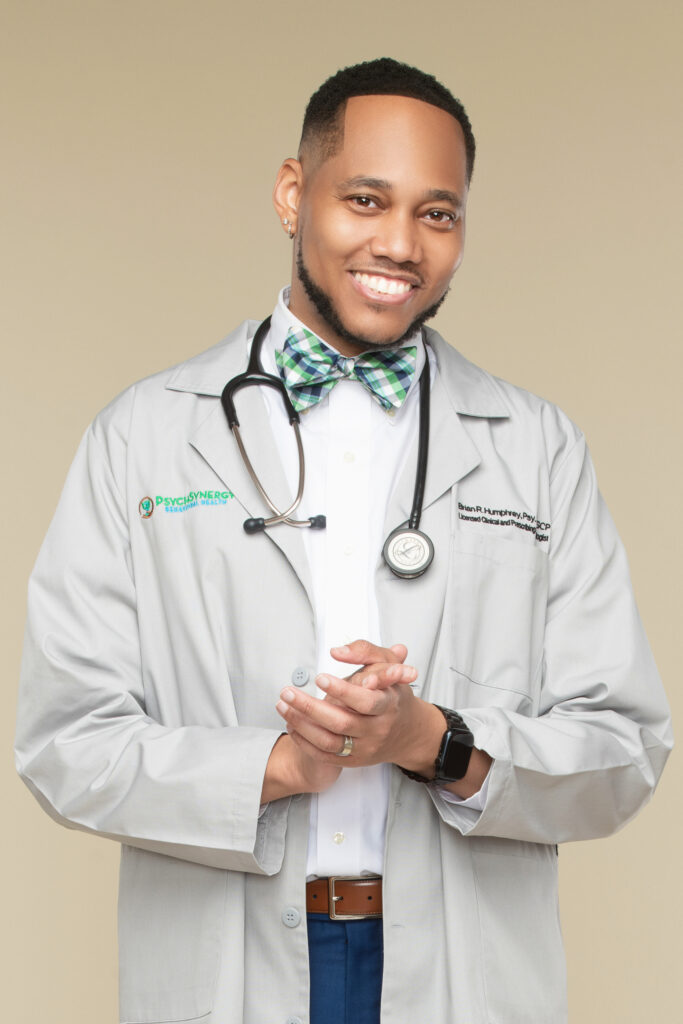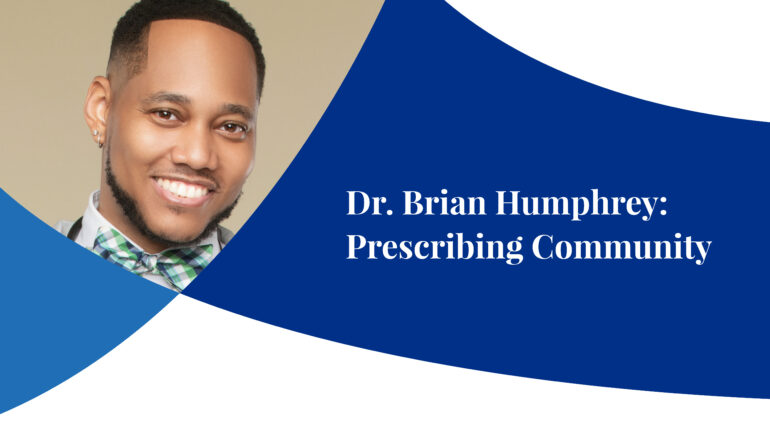On the West Side of Chicago, childhood memories are as likely to include drugs, gangs, and guns as they are cartoons, candy, and first crushes. Often, those memories yield trauma and hardship. Sometimes, however, they produce something better: faith and resilience.

That’s the case for Brian Humphrey, Psy.D., MSCP, who graduated from The Chicago School in 2019 with a master’s degree in clinical psychopharmacology. In 2023, he made history as the first Black male in Illinois to become a licensed prescribing psychologist.
Although he grew up surrounded by addiction and violence in Chicago’s blighted Austin neighborhood, Dr. Humphrey turned adversity into inspiration. “I come from really humble beginnings,” he says. “There were times when bullets came into our home and we had to jump on the floor. I’ve even seen people killed.”
Where others saw oppression, Dr. Humphrey saw opportunity. “Growing up that way made me curious,” he says. “I wanted to know why people did drugs and what made them be violent. I wanted to understand why it took two or three hours for someone to respond when a Black man in my neighborhood was shot. That’s what started my proverbial journey to psychology. I didn’t know what a psychologist was, but even as early as 6 years old, I knew I wanted to be a doctor and that I wanted to help people understand the way they think so they could change their behaviors.”
Decades later, he’s doing exactly what he wanted to do, exactly where he wanted to do it.
“I’ve served my entire career working in the kinds of places that most people don’t want to work in,” says Dr. Humphrey, who spends most of his time working with people of color in Chicago’s Austin, Englewood, and Woodlawn neighborhoods. “Those are three highly populated Black communities with a lot of poverty and violence. I work in those communities because I understand them. I connect with people who are oppressed or in really bad places. That’s truly, genuinely where my heart is.”
Finding his destiny
Although he now feels he was destined for a career in clinical psychology, Dr. Humphrey almost took a different path. After finishing his undergraduate career at the University of Illinois Urbana-Champaign, he spent a brief spell working a corporate job before going to medical school. He was well on his way to becoming a medical doctor when a car accident left him immobile for the better part of a year, forcing him to pause his studies.
“I was in rehab, so I couldn’t go to school,” recalls Dr. Humphrey, who audited a few psychology classes to keep his mind sharp while he was recovering. “When I did that, I realized, ‘Wow. This is what I actually want to do. So I never returned to med school.”
After earning a doctoral degree in clinical psychology, Dr. Humphrey immediately set to work helping the underserved communities about which he is so passionate. His first job as a clinical psychologist, for example, was working at Dixon Correctional Center, a medium-to-maximum-security prison two hours west of Chicago. After that, he worked at Lawndale Christian Health Center in Chicago’s Lawndale neighborhood, where he enjoyed marrying his faith with his profession. Finally, he landed at Cook County Health, where he spent four years working as a behavioral health psychologist. All the while, he taught classes part time, including seven years as an assistant professor at The Chicago School.
Eventually, Dr. Humphrey went from teaching at The Chicago School to becoming a student there. While he was at Cook County Health, he applied to The Chicago School’s M.S. Clinical Psychopharmacology program and was accepted into its inaugural class. Upon graduating summa cum laude, he resigned from Cook County Health to complete an 14-month residency encompassing nine medical rotations at AMITA Health. He completed that in 2022 and received his prescribing license this spring.
“The Chicago School has been pivotal to my career,” Dr. Humphrey says. “I couldn’t have accomplished what I’ve accomplished without going there. … People there took a chance on me. It’s my relationships with those people that allowed me to get my degree in clinical psychopharmacology, and without that degree, I wouldn’t be able to practice in the capacity that I’m now practicing.”
Battling stigma
Now that he’s a licensed prescribing psychologist, Dr. Humphrey wants to grow his private practice serving clients of color.
“Mental health historically has been a bit of a taboo topic in the Black community,” says Dr. Humphrey, who cites as one reason for his career path the passing of a childhood friend who died by suicide while Dr. Humphrey was in college. “Nobody understood what happened, but I later learned that he had bipolar disorder. He had a medication change and slipped into a manic episode during which he jumped out of a car and ran in front of a train. It was devastating to me.”
That experience led Dr. Humphrey to make it his mission to educate minority communities about mental health. “I grew up in a community where people said, ‘You can’t go to therapy. If you go to therapy, that means you’re crazy.’ I want to help dismantle those myths and the stigma around mental health, and I think being a Black man helps me do that, because a lot of times, people feel more comfortable talking to somebody who looks like them,” he says. “There’s a lot of trauma in the Black community because of our history and because of our lived experiences with racism and discrimination. I understand that trauma because I have lived it too.”
Dr. Humphrey’s prescribing authority is especially significant given the Black community’s history with pharmacology—going back to the Tuskegee experiment that took place between 1932 and 1972, during which time the U.S. Public Health Service surreptitiously denied treatment to Black men with syphilis in order to observe the disease’s natural course.
“There’s a general distrust of medicine in the Black community, but my patients trust me because they know I’m not in it for money or clout,” Dr. Humphrey says. “I’m in it to open doors for people to help them reach their full potential.”
Leading by example
Dr. Humphrey empowers patients not only with his counsel but also with his example. “I like to encourage people to be imaginative and to think the impossible, because it’s always impossible until someone does it,” he says. “I grew up in poverty, in a really disenfranchised neighborhood. Most of the peers I had growing up, unfortunately, are either deceased or in jail. The fact that someone like me exists is proof that Black people can do really big things.”
Doing really big things isn’t always easy, especially for people of color, many of whom—including Dr. Humphrey—face systemic obstacles that hinder their health and happiness. Growing up with a single mom who worked three jobs, he didn’t have the same resources and professional role models that kids in wealthier communities had. Even when he was completing his residency at AMITA Health, he had to make financial sacrifices that some of his white classmates didn’t.
“I love them, but some of my colleagues and peers decided that they weren’t going to work during their residency. I didn’t have that luxury,” Dr. Humphrey says. “My family really helped me, but the time I spent doing my residency was rough.”
Still, he insists the hardship was worth it. “Because I love the Black community, and because I feel so connected to it, I want there to be more individuals who serve and uplift it,” he says. “I love being one of them.”
As much as he loves being a change agent, what Dr. Humphrey loves even more is inspiring other change agents to work alongside him. So even as he builds his private practice, he has made it a priority work with community agencies and continue his participation in advocacy and legislative changes to remove barriers to mental health treatment within the black community. Additionally, Dr. Humphrey continues teaching classes at places like The Chicago School that nurture the next generation of mental health practitioners.
“When I leave the Earth one day, I want to know that I’m leaving it in a better place than it was when I got here,” Dr. Humphrey says. “That’s why I try so hard to mentor and guide and supervise and teach, so that there are more culturally sensitive clinicians in the world who are aware of biases and don’t allow them to be a hindrance.”

